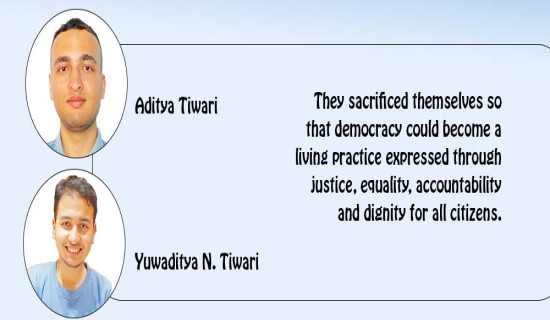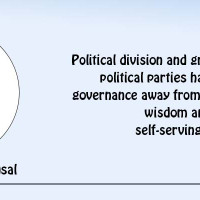- Friday, 30 January 2026
Development Needs Pragmatic Approach
The political parties, prominent leaders and most importantly the people as well, all want to see the rapid development of Nepal and also political stability and a better living standard of the general public. But just the election of a few good and talented individuals or the appointment of some well qualified persons to prominent posts does not seem enough for these things to happen. Real change must take place in the working style of the powerful people in the government and also in the attitude of the people themselves. They should not follow any body just because what he or she says.
The important part is in the determination of those who are in power is to completely shun favouritism, nepotism and corruption at all levels. Sadly, this has not happened and a few people, whether they are fit or not, are getting plum positions just because they are close with the leaders or one political party or the other. Cousins, close relatives, people with money and individuals who are close to some powerful leaders are also being appointed in fields where they are not suitable at all and many government sectors that could have contributed tremendously for the nation’s development have remained without any output and no one is interested in monitoring the works and efforts of these wrong appointees.
Nation’s missions
Just filing reports that goes mostly unread and sometimes the issues are raised only in conferences and seminars, are useless. Concrete achievements have to be shown in the nation’s missions abroad and also in the bureaucracy and other sectors which are spending huge funds from the government coffers for development works. But in the present difficult times also, it is encouraging that top level leaders, including present Prime Minister Pushpa Kamal Dahal Prachanda, have expressed determination to not only bring stability in politics, but also make bigger changes in the economic policy so that the nation can prosper and in this way the people can also live better lives.
These days, except for a few politicians, most experts and speakers on TV channels, constantly express apprehension about the shaky state of economy. The general people, who may not know or understand the intricacies of the complicated economic system, yet know that the nation and the public are not faring well. On the government’s side, it has not been able to spend the development budgets in time, increase exports and decrease imports while the income from revenue is also going down, according to officials themselves. At the same time, the regular budget of the government is astounding, and beyond the capacity of the government’s spending.
Even a ‘greenhorn’ in the economics field, this writer can say that this is a time for much austerity and spending will have to be slashed in many sectors, but this is not happening. Also, the monitoring system of the government departments concerned is so lax, especially in the markets of daily consumable goods that the common people are out of their wits end on how to make ends meet and survive in expensive areas. The remote villages have their own problems. This is why besides strict monitoring, the authorities must also plan on how the poorer section of the public, whether in urban areas or remote villages can feel the presence of the government.
Now we have seasoned leaders in the government and also many learned individuals who have started working in one government project or the other, so this is the time when pragmatic planning must take place so that common and yearly needs of those who contribute in the development efforts are timely met. This will help the country stand more strongly on its own feet and at the same time provide essential locally produced consumable goods to the people in abundance and competitive prices. Here, we cannot help but feel encouraged by the commitments of Prime Minister and also most of the ministers, especially those who are new and have not been tainted by any accusation of corruption, that they will work effortlessly from now on as there is a strong government and strong leadership, to make the country economically strong.
Honesty
So just appointing individuals who can spark dreams of a better future, individuals who have impressive degrees but are not very familiar with the poverty of the nation and others who have slyly climbed the political ladder for their own purpose will have to justify themselves or quit pulling the wool over the peoples’ eyes. The nation will need honest people who are very hard working and fully aware of what the people need to push forward the nation and not allow it to slide into the dark unknown situation, about which many so called ‘experts’ of well-known think tanks always talk about, especially in the media.
Talks, discussions, various types of meetings are important in their own ways. But what is decided in such gatherings of political leaders, bureaucrats, security officers or even with foreign officials, must be studied carefully and our own authorities must seriously consider what is good for the nation and what is not. It is now time for the policymakers to be more responsible and serious about what has been promised to the general public. The people have proved to a high degree what they are capable of in different parts of the world and they have equally shown their honesty and hard work which have impressed almost everyone. So the time is right to start sincerely dealing with the problems and in this way demonstrate that the government is really responsible towards the people by implementing pragmatic approaches not only in words but in deeds as well.
(The author is former chief editor of this daily.)

















